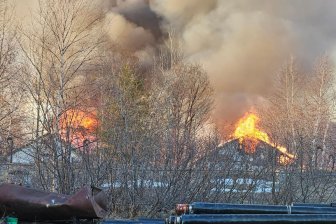Former governor general Michaelle Jean says wealthy countries must admit mistakes they’ve made in Haiti and pressure that nation’s elite to find a path out of an ongoing humanitarian crisis.

“What is endangered, at great risk, is the very national sovereignty of this country,” Jean said in French, in an extensive interview with The Canadian Press.
Jean said countries such as Canada need to take responsibility for ushering in debilitating economic policies in Haiti and deporting criminals who have sowed chaos in its capital, Port-au-Prince.
“We cannot look at all this with fatalism and say that this country is cursed. It is not cursed. It carries within it men and women of very strong will, who have even worked very hard to find a Haitian solution — but who also realize that they cannot achieve it alone.”
Jean was born in Haiti and was the former UNESCO envoy for that country after serving as Canada’s representative of the British monarch from 2005 to 2010.
Violent, feuding gangs have taken over the Haitian capital in recent months, sexually assaulting women and children and curtailing access to health care, electricity and clean water.
Hundreds have been killed and kidnapped by gangs who have filled a power vacuum in Haiti, which has not held elections since before the COVID-19 pandemic.

In July 2021, President Jovenel Moise was assassinated after a crackdown on Haitian democratic institutions that Jean argued the West should have called out, instead of allowing Moise to provide impunity to gangs.
“By destroying the country’s institutions, and even in wanting to manipulate the Constitution to stay in power _ eventually, the monster started to grow much stronger and bigger, and Jovenel Moise himself ended up being swallowed by this monster,” she said.
After his assassination, Canada joined the U.S., France and the UN in recognizing Moise’s unelected ally Ariel Henry as prime minister, who Jean said never had legitimacy in the eyes of the Haitian public.
A year later, as gangs took over the capital, Henry called for an international military intervention to allow for humanitarian aid and to create conditions safe enough to hold an election.

The U.S. supports the idea, arguing it could stem a growing migration crisis and prevent gangs from destabilizing the entire Caribbean.
Washington has said Canada would be an ideal country to lead such a force. But Prime Minister Justin Trudeau has responded that Ottawa will only act based on a political consensus of Haitians.
Jean said that means there must be a deal between Henry and the civil society groups who have demanded his resignation.
She also said she supports the Liberals’ decision to sanction 13 of Haiti’s political and economic elite, saying it was one of the few times the people responsible for human trafficking and arms trade have been called out.
“Now, for the first time that sanctions have been imposed on these individuals, it’s panic for them,” said Jean.
The U.S. also sanctioned some of the same people, and Jean argued France should join them in applying pressure.
She also said rich countries need to own up to policies that have sowed instability in Haiti, from economic reforms that led to the collapse of agricultural sectors to turning a blind eye when leaders who support the U.S. undermine civil society.
“Haitians also recognize their own responsibility in this situation, which is bad governance,” Jean said.
She was among dozens of high-profile signatories to an open letter issued this week in French, with the title “Taken hostage, Haiti is dying.”
The letter argues Haiti needs international help to avoid becoming a failed state.
The signatories include Senegalese President Macky Sall, who currently chairs the African Union, former UN under-secretary-general Adama Dieng and the former heads of government of Timor-Leste, Chad, Mali, Nigeria and the Central African Republic.

The letter notes that virtually the entire Haitian population descends from slaves brought from Africa, and that the country was the first to successfully overthrow a colonial government in 1804.
“The first Black republic, perhaps the most fragile within the family of nations, is short of food, drinking water, fuel, peace, justice,” the letter reads.
When the country ousted the French, Paris imposed a crippling debt to compensate slaveowners. The country faced a series of invasions, corrupt governments and deforestation.
“These factors could only result in a failed state, fed for many decades with the adrenaline of violence and the jolts of anarchy and chaos,” the letter reads.
“It is difficult to imagine the resolution of this Gordian knot without outside intervention,” the letter reads, stressing that this might mean support for justice and governance systems instead of a military occupation.
Jean said that could mean building up institutions led by Haitians and providing technical support.
She said she witnessed RCMP and provincial officers provide training to local police that helped them prove more successful at weeding out crime than peers who had been instructed by UN peacekeepers.
“History will not be kind to those who remain inactive or who choose to look elsewhere,” the letter warns.



Comments